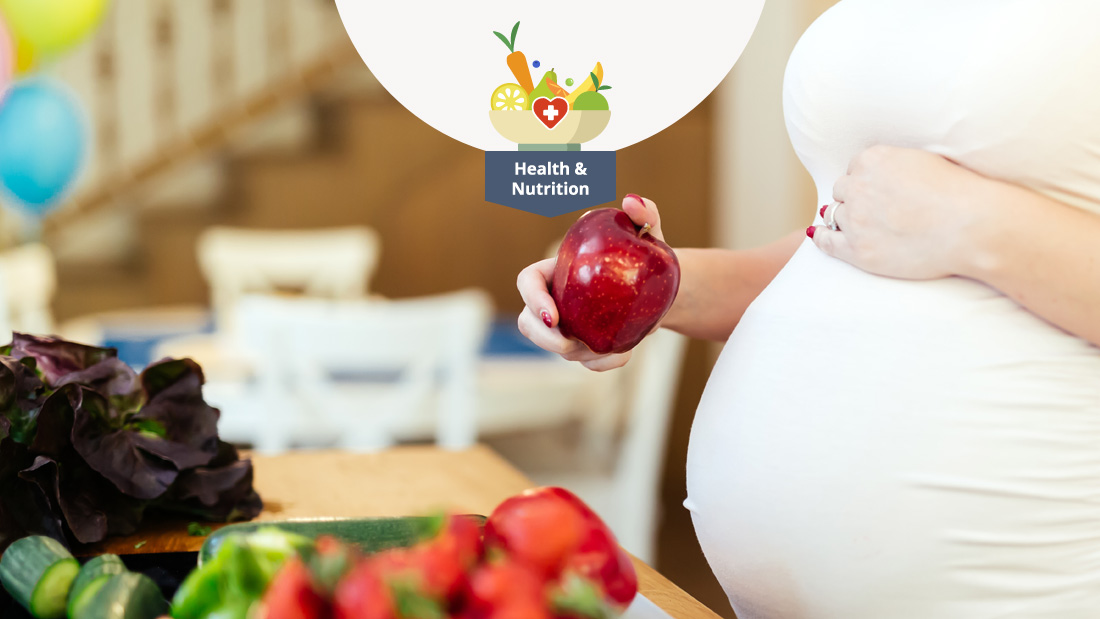
Make your diet count in late pregnancy
In the early months of pregnancy you hopefully had the “eating for two” myth dispelled quickly. Pregnant women in the first two trimesters just don’t need to increase their intake of food because, despite having a tiny human growing inside them, their energy needs don’t change too much during the first six months.
However, in the third trimester, the idea of eating for two becomes a bit closer to a reality. Your bump has grown a lot over the last few months, and feelings of tiredness and fatigue – symptoms you may have thought you were done with after the end of your first trimester – come creeping back. This is why, it’s now crucial to make sure you’re eating enough to ensure good energy levels. Not eating enough (or eating the wrong types of food) will only lead to your feelings of fatigue getting worse.
How much extra should I be eating?
You need to increase about 200 extra calories per day in these last three months before the birth. Keep in mind that this number is based on averages, and the number of calories you require will depend on your BMI and how active you are. If you were underweight before becoming pregnant, you’ll need to eat more, and if you were overweight before pregnancy, you’ll need fewer calories.
You should be gaining about one pound per week in your third trimester. If you’re hitting this increase each week, then that’s a sign you’re eating enough.
What should I be eating and what should I avoid?
An extra 200 calories isn’t that much to add, but it’s important that you reach it by eating the right foods. Although unlikely to do you much harm, getting to your calorie target by eating empty calories – foods with lots of calories but no nutrients to speak of – isn’t going to do you much good either.
We may be restating what your doctor or midwife has already told you, but here are some main food offenders that are just not really very good for you.
- Fizzy drinks
- All fast food
- Chocolate
- Biscuits
- Pastries
- Oils
- Salad dressings
- Cakes
The vitamins and minerals that have been essential for good pregnancy health up to this point are still important now – you just need to consume a little bit more of them. So, you need to continue getting healthy doses of vitamin C, vitamin K, vitamin B1 (thiamine) and plenty of fibre.
Fresh fruit is an excellent source of both Vitamin C and fibre, and it’s great to have as a quick snack on-the-go. Berries and citrus fruits contain the most vitamin C. Remember, vitamin C is important because it keeps your immune system strong and helps your body absorb iron, helping you avoid anaemia.
You’ll also require slightly more folic acid in your third trimester, so fortified cereals, green leafy vegetables, and wholegrains are good to have. Dark leafy green vegetables (spinach, Kale, and chard) will also help you get plenty of vitamin K.
The amino acids in protein act as the building blocks for your baby’s body, so it’s particularly important that you increase your protein intake in the last trimester because this is when your baby is growing the fastest. Low-fat forms of protein, such as lean meat, fish, and poultry are the best choices.
Vitamin D regulates calcium in the body and is essential for bone health. Your doctor may have already recommended you take a vitamin D supplement to get the sufficient amount, but oily fish and eggs are great natural sources.
Some simple snack ideas
Here are just a few simple ideas for snacks and meals you can incorporate into your diet to help you reach your calorie goal.
Porridge – For breakfast, a bowl of porridge topped with a handful of fresh fruit will give you a good amount of fibre. A bowl of fortified cereal is another alternative.
Baked beans on wholemeal toast – Baked beans are a great source of fibre and vitamin B1, which will help make sure your energy levels stay constant throughout the day.
Fruit smoothies – Smoothies are a great way of getting all the antioxidants and vitamins from fruit in one tasty drink. They can also provide a more flavourful alternative to simply drinking water all the time. Ones made from berries will ensure you’re getting enough vitamin C in your system, but watch out for shop-bought smoothies which may contain added sugar.
Vegetable soup – Just like fruit smoothies, vegetable soups are an efficient way of packing in the nutrients, as you’re getting the goodness of several different vegetables in one sitting. You can make your own at home or buy one that is low in salt from the shop.
Omelette – A well-cooked omelette with healthy fillings, such as chees and mushrooms, will help you get more than enough vitamin D and iron.
Lean steak – Of course, steak is a fantastic source of iron and protein. However, when preparing meat yourself, take extra care to make sure it’s cooked thoroughly before eating.
Remember to continue to make sure you drink plenty of water, as staying hydrated is key. As long as you keep to a well-balanced diet with a slight increase in calories, you’ll be giving your body and your growing baby all the nutrients required. In doing so, you’ll also be giving yourself the best chance of giving birth to a healthy, happy baby. Not to mention, you’ll be helping to keep your weight gain under control, making it easier on your body in the postpartum period.
If you need any further guidance on sticking to a healthy diet or are unsure about any of your current diet choices, your doctor or midwife will be more than willing to help, and be sure to discuss any supplements you plan to take with them first.


